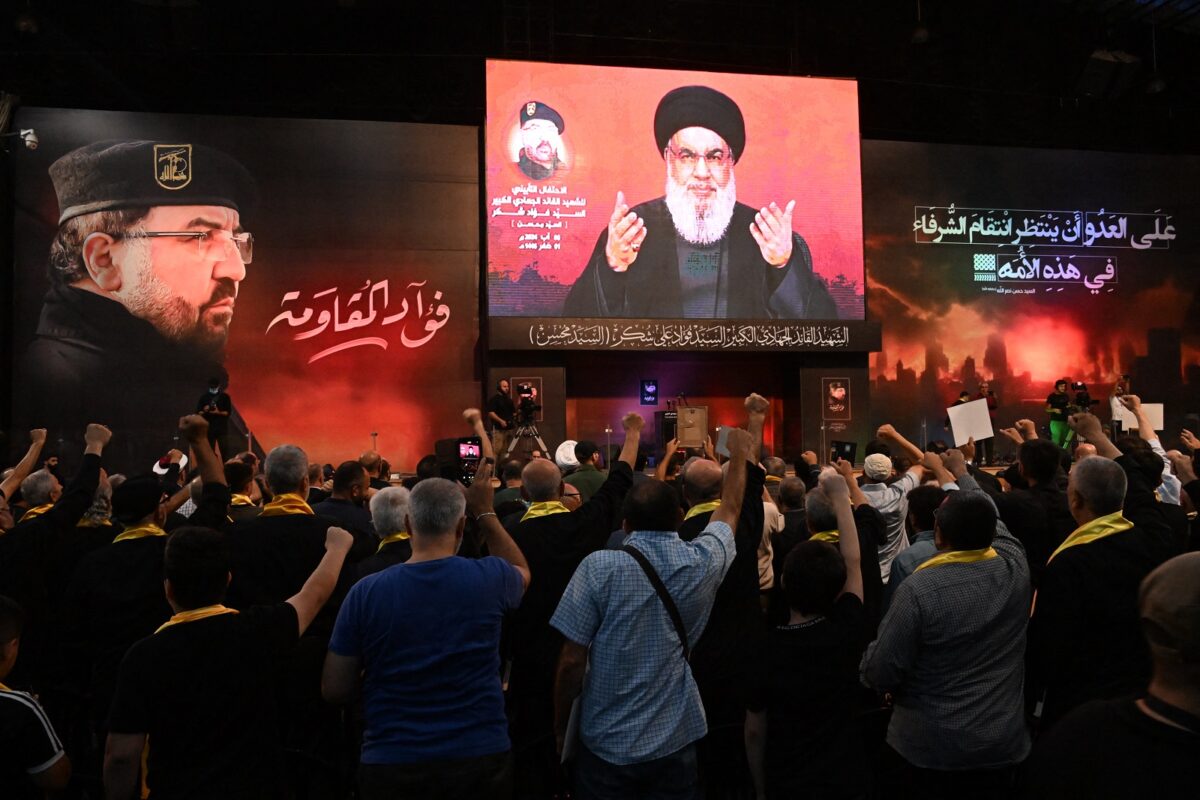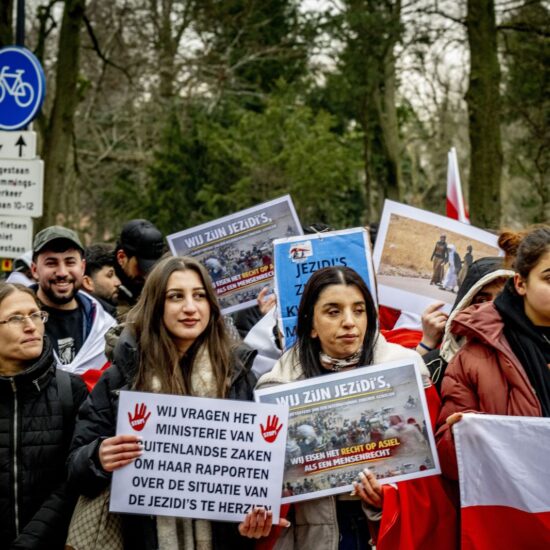
Commemorating his top-military commander Fouad Shukur’s death, Hezbollah Secretary-General Hassan Nasrallah delivered yet another of his speeches, calling for a “fine” retaliation against Israel and a general mobilization of all the support fronts and beyond
Just before he spoke, two large sonic booms – the likes of which had not been heard yet since the beginning of the war. In the heart of Beirut, until now spared but back at the threatening center of Israel’s psychological war, so was expected yesterday, August 6, yet another speech by Hassan Nasrallah, Secretary-General of Hezbollah, announced after the latest pair of attacks that shook the Middle East beyond the borders of Gaza, the refugee camps of the West Bank, and southern Lebanon.
On Tuesday afternoon, the assassination in Dahiyeh of the top-military commander Fouad Shukur, known as Mohsen, the party name with which Al-Sayyed remembered him during the speech, commemorating an attack in which five innocent people, three women and two children, lost their life; and on Wednesday morning, at dawn, another blow outside the boundaries that the habit of the ‘war of others’ – in the last ten months – has marked, in the general adaptation given by survival, the instinct not to die, but also by political interests, positioning, and alliances. In Tehran, a short-range projectile took out the political leader of Hamas, Ismail Haniyeh, the last stronghold of the moderate wing of the Palestinian movement. Two Israeli achievements, but not victories – as Hezbollah’s Secretary-General himself stated.
And before Hamas announced that it had replaced Haniyeh with Yahya Sinwar – dubbed the ‘butcher of Khan Younis,’ hidden in the basement of the Strip and already announced dead by Israeli forces – Nasrallah spoke. “The Israeli enemy is breaking the sound barrier over the southern suburbs to frighten those gathered for the ceremony. It has such a small mind,” he began.
Commemorating Fouad Shukur
At the center of Nasrallah’s speech, the commemoration of Fouad Shukur, a great loss for the Iran-backed party that yet “does not shake us at all and does not make us hesitate or stop,” the Secretary-General said, downplaying the effects of the assassination on the organization, and affirming that it had not impacted its military capabilities. His death, along that of Hamas’ Haniyeh, are of course to be read as Israeli successes: though, according to Nasrallah, they do not change the nature of the battle.
Accused of having orchestrated the Majdal Shams massacre, in the Israeli-occupied Golan Heights – an accusation that Hezbollah rejects -, Shukur was the party’s main military commander in southern Lebanon, as well as a senior member of the Jihad Council.
Commenting on the Israeli army investigation which has concluded that the rocket that wounded two people in Nahariya, north of the city of Acre, was an interceptor missile that missed its target before falling to the ground – therefore not being a direct Hezbollah shot -, Nasrallah called for transparency. He stated: “the Israeli army has admitted that what happened in Nahariya was caused by an interceptor missile, but it does not dare to tell the truth about what happened in Majdal Shams.”
In any case, while theories about the attack on the Golan are teeming – and responsibilities are getting blurred – Israel has identified its culprits and launched the counteroffensive. The two revenge-blows to which Iran, through its allies in the region, is called upon to respond.
Leading the region’s multiple fronts
Unlike previous speeches, Nasrallah addressed Amman and Damascus directly – the latter of which he had previously justified for its non-participation in the conflict, torn by 13 years of civil war. “If Israel prevails,” he stated, “there will no longer be a Hashemite kingdom in Jordan. In Syria too, the Israelis will install an ally in power, working to make the Syrian leader a friend” he added, suggesting that the ongoing battle between the ‘axis of resistance’ and Israel also aims to protect the two neighboring countries – while questioning the loyalty of Bashar al-Assad, that Hezbollah supports.
In a power vacuum, perhaps, the opportunity to fill it, to become a guide, a point of reference for other realities – Jordan and Syria – that, each in their own way, are distancing themselves from Hamas’ October 7 al-Aqsa Flood.
But the enemy is one and has revealed the same face for everyone: “if Israeli Prime Minister Benjamin Netanyahu and the US-Zionist alliance is victorious over the resistance in Gaza and the West Bank, the entity that kills children will solidify itself in the region,” warned Nasrallah, adding that “we face the danger that the occupying entity will dominate the region,” that “there will be no Palestine and the al-Aqsa Mosque will be seriously threatened,” and “Lebanon and its riches will also be at risk, Egypt and all the countries in the region will be threatened.”
And as if he had put aside his ambition to act as spokesperson for the whole Lebanese front – addressing the Lebanese who do not “fear the victory of the Israeli enemy” and “do not support Hezbollah” by asking them “not to betray the resistance and not to take part in the psychological warfare against it” -, Nasrallah crossed the rhetorical borders of southern Lebanon to appeal to the Palestinian resistance, asking them – besieged in Gaza and the West Bank – “to show more patience and firmness.” And he continued – foreseeing the end of a war that he defines as a “battle” – calling on the support fronts in Lebanon, Iraq and Yemen “to continue supporting Gaza despite the sacrifices,” and the rest of the Arab countries “to wake up to the danger threatening the region.”
Waiting for a subtle response
The Israeli answer, during Nasrallah’s speech, was the following: “Israel must not respond to Hassan Nasrallah, Israel must assassinate him,” Israeli Finance Minister Bezalel Smotrich wrote on X. But Al-Sayyed is setting aside a different retaliation. “The Israeli wait for a week is part of the punishment,” he claimed.
Asserting that the psychological warfare but also, especially, the economic losses of Israel – which he estimates at several billion – are part of the response to the assassination of Shukur, Nasrallah implied that even though the revenge for the attack on the southern suburbs of Beirut is delayed – and could have a relatively moderate effect – the retaliation has already begun and is already hurting the Israelis. “The response will surely come. One must act with courage but also with finesse. One must not be impulsive.”
As in his first speech, the Hezbollah leader advocated a “wise” response to the Israeli aggression against Dahiyeh. Just as Iran was forced to fight after the attack on the Iranian consulate in Damascus, he claimed, the Islamic Republic is now forced to fight after the assassination of Ismael Haniyeh in Tehran. However, while insisting that the retaliation this time will be more intense than previous assassinations, Nasrallah continued to give the impression that he does not want the clashes to escalate to an all-out war.
“It is the Israelis who went towards the escalation,” he reminded, adding that, to pursue that objective, they don’t need a pretext. “We have always taken into consideration the situation in Lebanon and have managed the battle in a way that there is simultaneously in Lebanon an open support front, music festivals, and crowded restaurants,” Nasrallah claimed, suggesting that a part of Lebanon will still be spared by the possibility of a wider conflict. Yet, “the Israeli danger cannot be faced by playing ostrich and running away from the storm, because the enemy fights without red lines,” he continued. “What is needed is confrontation and confrontation, not hesitation and submission.”
In the meantime, while sonic booms keep on terrifying the people all over Lebanon, Hezbollah’s military front in the south has continued its targeted attacks against Israeli military sites, suggesting that the retaliation for Shukur and Haniyeh assassinations might not overturn the precarious balance that has dictated the rule of war in Lebanon during the past ten months.








